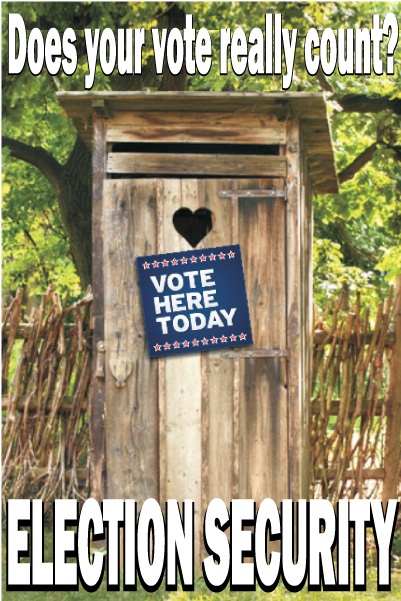 Elections are the foundation of democracy. Even when we have to hold our noses to do it, we cast our votes with confidence that they will be accurately tallied and faithfully reported. What happens if that confidence is misplaced? Stalin was credited as saying “It doesn’t matter who votes, or how, it matters who counts the votes.” Do the people who count OUR votes try to be accurate, or do they try to get a particular outcome?
Elections are the foundation of democracy. Even when we have to hold our noses to do it, we cast our votes with confidence that they will be accurately tallied and faithfully reported. What happens if that confidence is misplaced? Stalin was credited as saying “It doesn’t matter who votes, or how, it matters who counts the votes.” Do the people who count OUR votes try to be accurate, or do they try to get a particular outcome?
Election fraud is not the same thing as voter fraud. In voter fraud, people who are not registered or not legally able to  vote for other reasons cast illegitimate ballots. In election fraud, the total of the votes is adjusted to change the election. Voter fraud changes elections in groups of ones, twos, or tens. Election fraud changes it in groups of hundreds or thousands. Both are illegal and wrong, but voter fraud stands a much smaller chance of changing an election than election fraud. Election fraud becomes a likely, wide-scale threat when the processes used in elections aren’t secure.
vote for other reasons cast illegitimate ballots. In election fraud, the total of the votes is adjusted to change the election. Voter fraud changes elections in groups of ones, twos, or tens. Election fraud changes it in groups of hundreds or thousands. Both are illegal and wrong, but voter fraud stands a much smaller chance of changing an election than election fraud. Election fraud becomes a likely, wide-scale threat when the processes used in elections aren’t secure.
No matter where you stand on the political spectrum, it would seem that election security is an issue everyone can get behind. After all, who wouldn’t want secure, accurate elections? Well, because this is “News To Make You Furious”, we’ll tell you… Diebold, the manufacturers of the touch-screen machines widely used in State and Federal elections across the country. They have zealously defended their “proprietary” software on their machines as a business secret, and have touted the secure nature of their machines. Bull puckey. Their right to business secrets is overwhelmed by the right of our country to accurate elections, and their “iron-clad” security has been pierced repeatedly.
What are some of the problems with the Diebold machines?
The Argonne National Laboratory Vulnerability Assessment team evaluates security threats for our government. They performed a hack on machines similar to the ones to be used for the 2012 election and were found that it could be done “with just $10.50 in parts and an 8th grade science education.” Even more alarming, it’s believed that the hack can be carried out without any trace of tampering having occurred.
Here’s the testimony of a computer programmer that it is easy to program a hack for electronic voting machines, and that Tom Feeney tried to pay him to do it. Feeney was Speaker of the House of Florida at the time, and went on to represent Florida in the US House of Representatives from 2003-2009.
One of the hacks of the Diebold machines even has a name. The Hursti Hack is named after Harri Hursti, one of its creators. This Wikipedia page tells you all about it.
This report outlines the specific vulnerabilities of the Diebold touch-screen voting machines.
Here’s an article on more severe flaws in Diebold voting machines
Most of the above hacks require physical interaction with the machine, a significant (but not unbeatable) obstacle to tampering. But technology marches on, and new improved hacks can be done by remote control.
Here’s two papers on the state of election security from IEEE, one of the largest computer engineering and technology associations. Election Security: Perception and Reality by David Evans and Nathanael Paul, and Hack-a-Vote: Security Issues with Electronic Voting Systems
What groups are working to ensure election integrity?
The ACE Electoral Knowledge Network is an in-depth resource that “…promotes credible, and transparent electoral processes with emphasis on sustainability, professionalism and trust in the electoral process”. Their website is focused on international elections (although the material also applies to US elections), and includes an encyclopedia with over 10,000 pages on electoral systems, legal election frameworks, direct democracy, and more.
Election Integrity works to promote election verification, demystification of election processes, and democracy-building. Their section on exit polling is particularly interesting.
BlackBoxVoting.org describes itself as “Americaa’s Elections Watchdog Group”, and their website contains a wealth of info on latest election news, investigations, and more. If you find that interesting, you’ll probably also like BlackBoxVoting.com.
The Open Voting Foundation advocates building elections systems based on open source software, rather than proprietary software
How will it all end?
Badly. This hidden camera video shows an encounter between one voter and an electronic voting machine











